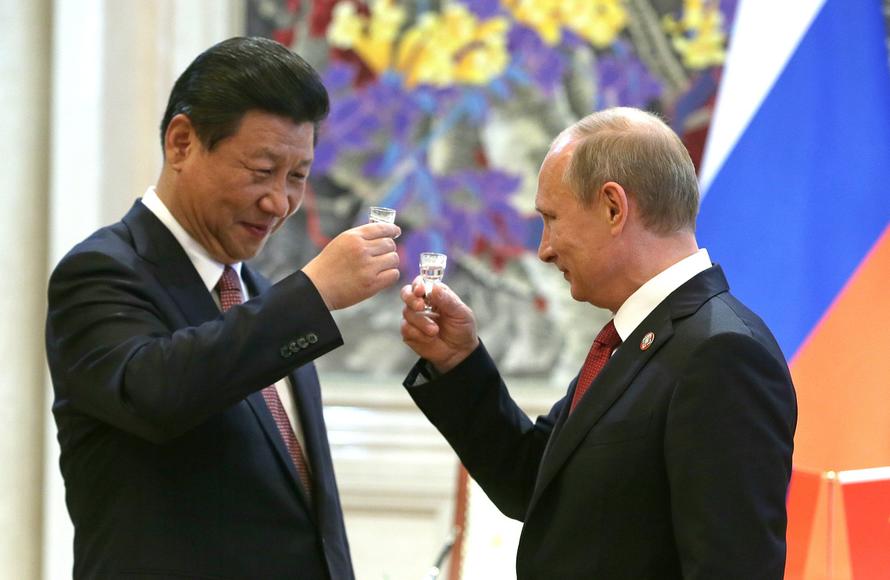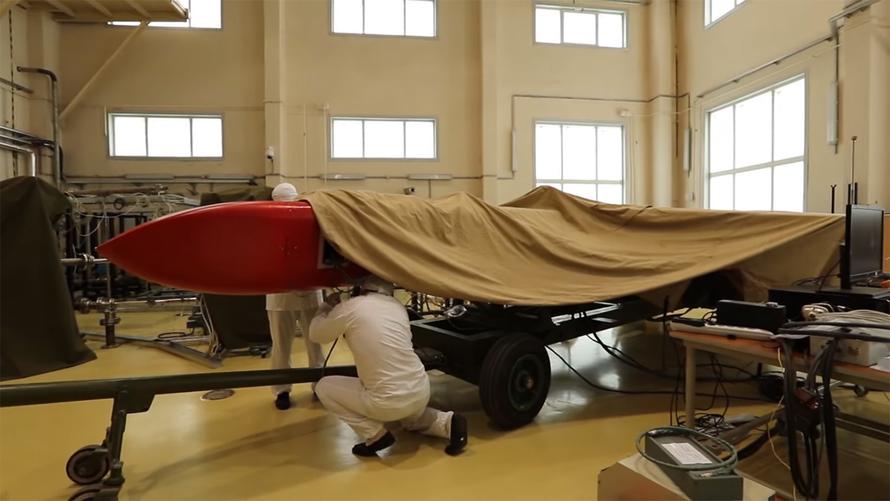First reports reaching DEBKAfile’s military sources say that a US submarine intercepted a Russian nuclear sub in American waters opposite Alaska. The Russian sub escorting the nuclear submarine responded with a Balkan 2000 torpedo and scuttled the US vessel. Urgent consultations in both the White House and the Kremlin were taking place on Tuesday night. US Vice President Mike Pence called off an appearance in New Hampshire after being recalled to Washington for a conference called by President Donald Trump without explanation. Continue reading
Tag Archives: Moscow
The U.S. Will Develop Newly Unbanned Weapons as a Key Missile Treaty Ends
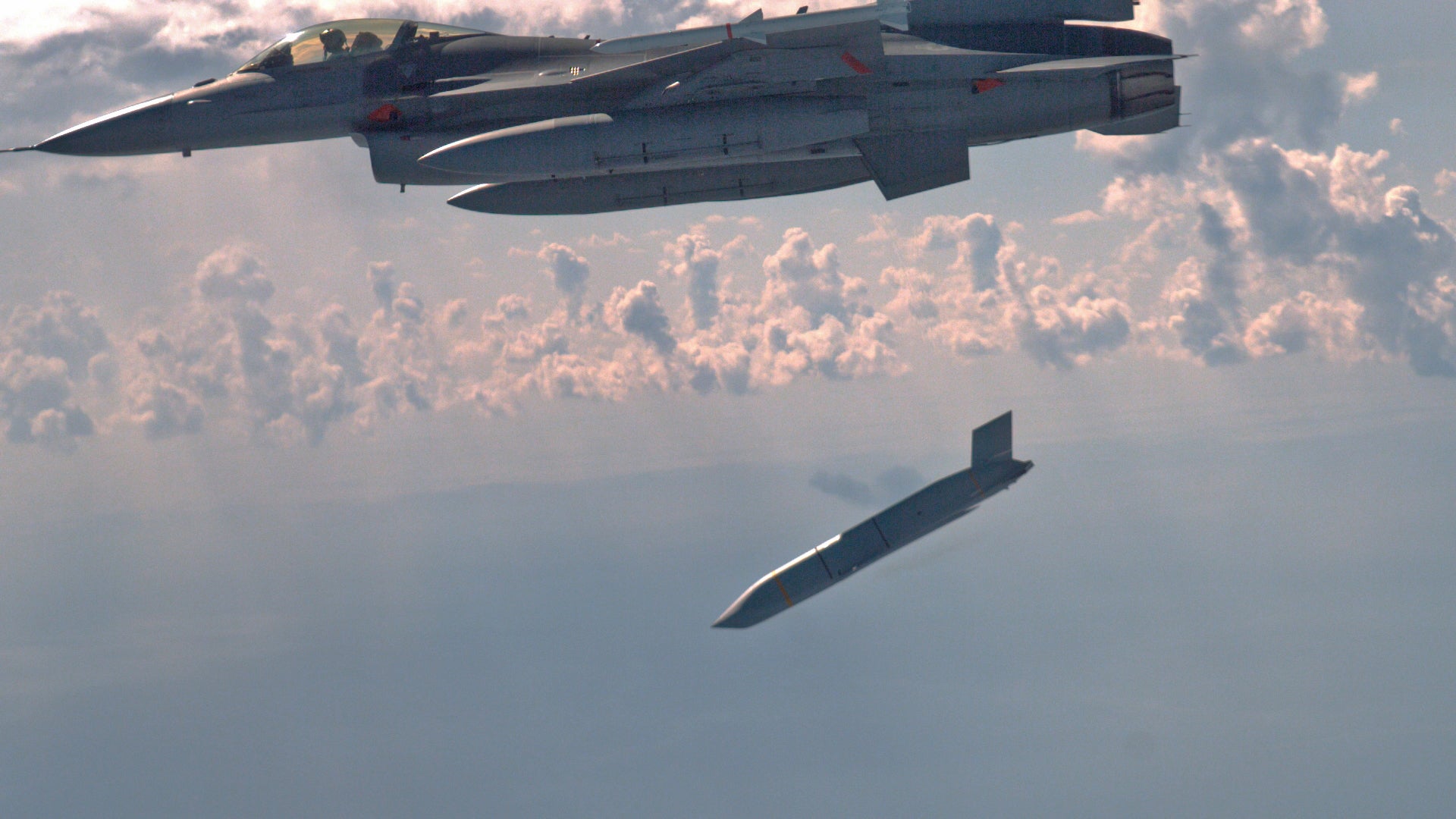
A JASSM missile undergoing launch tests from a F-16 fighter over the Gulf of Mexico, 2018. Image: SMgst Michael Jackson (Air Force)
The United States is planning to quickly develop two new missiles previously banned by a 30-year-old arms control treaty. America’s withdrawal from the Intermediate-Range Nuclear Forces Treaty, sparked by allegations of Russian cheating, is paving the way for Washington to match Russian weapons with new missiles of its own. The U.S. will test the missiles as soon as this August, within days of the end of the treaty.
The two missile types, a ground-launched cruise missile and an intermediate-range ballistic missile, were previously banned by the Intermediate-Range Nuclear Forces Treaty. The INF Treaty, signed in 1987, banned land-based missiles with ranges from 310 to 3,420 miles.
Although the treaty itself didn’t ban actual nuclear weapons, it removed key nuclear delivery systems from the inventories of both the U.S. and U.S.S.R., dramatically lowering the number of nuclear weapons deployed in Europe. Continue reading
Turkey: Putin’s Ally in NATO?

Turkey has NATO’s second biggest army, and its military love affair with Russia may be in its infancy now, but it undermines NATO’s military deterrence against Russia. Pictured: Turkish President Recep Tayyip Erdoğan meets with Russian President Vladimir Putin in Moscow, on March 10, 2017. (Image source: kremlin.ru)
- On March 7, Turkish President Recep Tayyip Erdoğan said Turkey would never turn back from the S-400 missile deal with Russia. He even added that Ankara may subsequently look into buying the more advanced S-500 systems now under construction in Russia.
- With the S-400 deal, Turkey is simply telling its theoretical Western allies that it views “them,” and “not Russia,” as a security threat. Given that Russia is widely considered a security threat to NATO, Turkey’s odd-one-out position inevitably calls for questioning its official NATO identity.
- Turkey has NATO’s second biggest army, and its military love affair with Russia may be in its infancy now, but it undermines NATO’s military deterrence against Russia.
On September 17, 1950, more than 68 years ago, the first Turkish brigade left the port of Mersin on the Mediterranean coast, arriving, 26 days later, at Busan in Korea. Turkey was the first country, after the United States, to answer the United Nations’ call for military aid to South Korea after the North attacked that year. Turkey sent four brigades (a total of 21,212 soldiers) to a country that is 7,785 km away. By the end of the Korean War, Turkey had lost 741 soldiers killed in action. The U.N. Memorial Cemetery in Busan embraces 462 Turkish soldiers. Continue reading
Russian Military Chief Outlines Aggressive Anti-U.S. War Strategy

Valery Gerasimov / Getty Images
Gerasimov vows more non-military war against America
Russia’s large-scale military buildup is being augmented by greater use of non-military warfare against the United States, the chief of the Russian general staff revealed last week.
Gen. Valery Gerasimov, author of Russia’s use of “hybrid” warfare, announced the greater adoption of asymmetric warfare tools—cyber, space, and information weapons—in response to what he said are stepped up plans for information operations by the Pentagon. Continue reading
Niall Ferguson: This is what happens if China wins the new cold war
The winter of a new cold war is coming between the US and China, renowned Hoover Institution and Harvard historian Niall Ferguson warned The Australian Financial Review Business Summit this week.
Winning it might decide the 2020 US election. Losing it might be the end of a US dollar-dominated global financial system, if not worse. That’s very scary coming from the man who called the scale of the Soviet communist collapse in 1989 and the US mortgage implosion two years early in 2006. Continue reading
U.S. hits back against Chinese cyberattacks

The Chinese military hacker unit has conducted operations since at least 2013 in support of China’s naval modernization effort. (U.S. Navy) (Photo by: Samuel Shavers)
American intelligence and military cyberwarriors have begun conducting counter-cyberattacks against Chinese intelligence and military targets, according to a U.S. official.
The counterattacks are part of a new Trump administration policy designed to retaliate for rampant cybertheft of American technology by the Chinese that has caused estimated losses ranging from $200 billion to $600 billion a year. Details of the U.S. cyberoperations were not disclosed, and the activities remain classified.
The hacking is likely to include theft of Chinese advanced military know-how, such as hypersonic missile technology — an area of military research where China is believed to be ahead of the United States. Another possible target would be technology related to China’s anti-ship ballistic missile technology like that deployed in the DF-21D ship-killing missile. Such technology requires maneuvering warheads and special guidance. Continue reading
New Russian missile threat to homeland
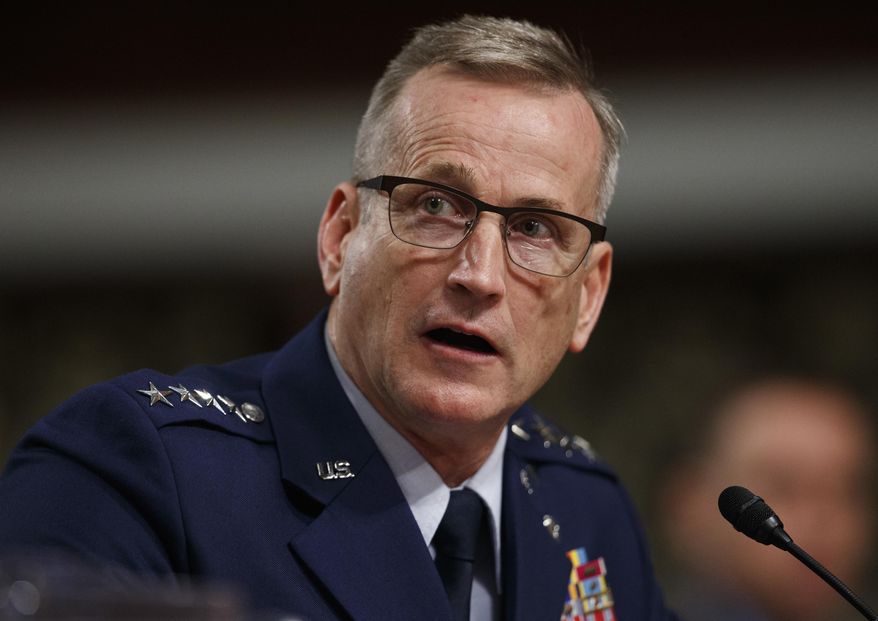
Air Force Gen. Terrence O’Shaughnessy, who is also commander of the U.S.-Canadian North American Aerospace Command (NORAD), said Russia “only recently developed and deployed capabilities to threaten us below the nuclear threshold.” (Associated Press/File)
The commander of the military’s Northern Command warned this week that Moscow is deploying conventionally armed missiles that for the first time are capable of striking targets deep inside the United States.
Air Force Gen. Terrence O’Shaughnessy, who is also commander of the U.S.-Canadian North American Aerospace Command (NORAD), stated in prepared congressional testimony that while Russian nuclear missiles have threatened the country for more than 50 years, Moscow “only recently developed and deployed capabilities to threaten us below the nuclear threshold.” Continue reading
Intel: How Turkey is turning to Russia amid row with US over Syria

Russian Foreign Minister Sergey Lavrov (R) and Turkish counterpart Mevlut Cavusoglu give a joint press conference after their meeting in Moscow, Aug. 24, 2018. (KIRILL KUDRYAVTSEV/AFP/Getty Images)
The timing of the Turkish foreign minister’s unexpected phone call today with his Russian counterpart in the middle of US-Turkey talks on Syria is the latest sign that Washington and Ankara remain hopelessly at odds over how to move forward in the region.
Why it matters: Mevlut Cavusoglu’s call to Sergey Lavrov was made “upon the initiative of the Turkish side,” the Russian Foreign Ministry said in a statement. The Syria dossier topped the agenda. Continue reading
Russian Weapons Circumvent New START Arms Pact

Gen. John Hyten / Getty Images
Stratcom wants nuclear torpedo, advanced missiles covered if New START extended
The general in charge of U.S. nuclear forces warned Tuesday that Russia is building three new strategic weapons that circumvent the limits of the New START arms treaty.
Air Force Gen. John Hyten, commander of the Omaha-based Strategic Command, told Congress he favors requiring limits on the new weapons in any extension of the 2010 strategic arms accord. Continue reading
After Putin’s warning, Russian TV lists nuclear targets in U.S.
FILE PHOTO: Russian President Vladimir Putin meets with FIFA President Gianni Infantino at the Kremlin in Moscow, Russia February 20, 2019. (Yuri Kadobnov/Pool via REUTERS)
MOSCOW (Reuters) – Russian state television has listed U.S. military facilities that Moscow would target in the event of a nuclear strike, and said that a hypersonic missile Russia is developing would be able to hit them in less than five minutes.
The targets included the Pentagon and the presidential retreat in Camp David, Maryland. Continue reading
Putin Says Russia Could Target US if New Missiles Put in Europe
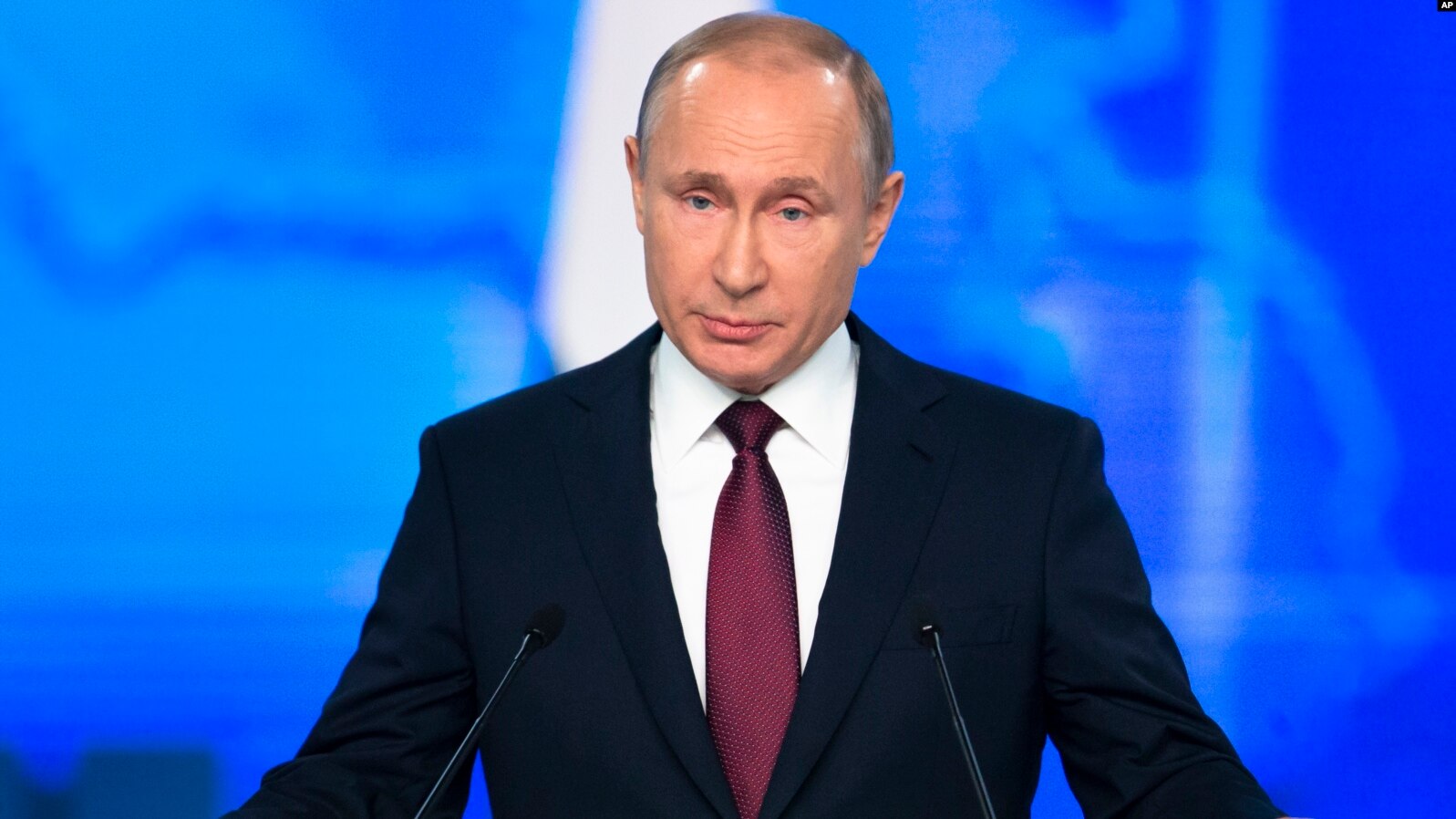
Russian President Vladimir Putin delivers a state-of-the-nation address in Moscow, Russia, Wednesday, Feb. 20, 2019. (AP)
President Vladimir Putin says Russia is prepared to target American “decision-making centers” if the United States sends new missiles to Europe.
The Russian leader spoke Wednesday during his state-of-the-nation address in Moscow. He said Russia would answer any U.S. move to deploy new missiles closer to Russia by stationing its own new missiles closer to America or by deploying faster missiles. Continue reading
Russia To China: Together We Can Rule The World
A new eye-opening op-ed in Politico brings fresh realism to the fact that “Europe’s obsession with Russia is unrequited” as “Moscow just isn’t interested in the Continent anymore.” Because instead it’s now “all about China” from Moscow’s vantage point, now all-in on its long stated intent to convince Beijing it’s time to form an alliance capable of breaking US global hegemony.
Bruno Maçães, a former Europe minister for Portugal and Eurasian affairs analyst finds based on the real discussions taking place in diplomatic corridors (as opposed to the abstract talking points of mainstream western pundits — predicated on the assumption that Russia perpetually seeks to pull Europe in its direction), that Moscow is no longer pursuing European integration following sanctions and the unraveling of the INF, but senses a new opportunity given Washington’s tariffs on Chinese exports. No longer, the ex-European diplomat concludes, does Russia hope to emulate or compete with the Chinese economy, which it realizes it can’t do, but instead has a bigger geopolitical alliance in mind. Continue reading
Russia Touts “Unlimited Range” Of New Nuclear Cruise Missile As INF Unravels
Following the dramatic US withdrawal from the Intermediate-Range Nuclear Forces Treaty (INF) within the last month and amidst continuing tit-for-tat accusations between Moscow and Washington since then, which even appears to have imperiled the future of the New START treaty, Russia is aggressively touting its new nuclear cruise missile, the 9M730 Burevestnik (or “Storm Petrel”), which Russian media reports say has entered the final stage of testing and development. Continue reading
DIA: China to Deploy ASAT Laser by 2020

China’s President Xi Jinping / Getty Images
China, Russia also set to use anti-satellite missiles
China’s military is expected to deploy a laser weapon capable of destroying or damaging U.S. military satellites in low earth orbit in the next year, the Pentagon’s Defense Intelligence Agency disclosed in a report on space threats.
The Chinese directed energy weapon is among an array of space warfare tools that include ground-based anti-satellite (ASAT) missiles, electronic jammers, cyber attacks, and small satellites Beijing plans to use in attacks on U.S. satellites in a future conflict. Continue reading
President Putin’s “Great Society” Program Will Build The Future Russia
The Russian government announced that it’ll commit approximately $390 billion to implementing President Putin’s “May Decrees” that he issued following his reelection last year on a promise to revitalize the domestic economy and finally deliver tangible benefits to the majority of the population, especially those outside of the main cities of Moscow and St. Petersburg who’ve barely seen much of their livelihoods improve over the past two decades. This visionary initiative is being called the “Great Society” program and will consist of 12 National Projects that run the gamut of everything from agriculture to industry to transportation infrastructure and all that’s in between, with specific emphases also being placed on ecology, education, and the digital economy. Continue reading


